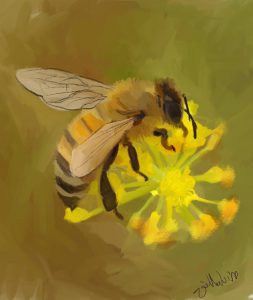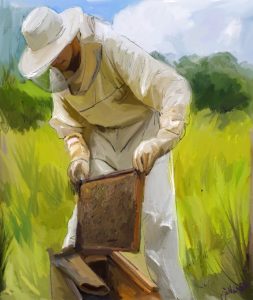In the Tarkine, Tasmania’s sweet, mild summer only lasts for six to eight weeks, and during that time, beekeepers come to our house and stay for the annual blooming of the leatherwood trees. You can find them scattered throughout the wilderness, the light sprinkles of white and pink blossoms framed by the taller, darker Eucalypts. A subtle fragrance follows the blooming of the flowers, and drifts through the forest, turning the damp air sweet, and attracting the honey bees.
My mum and I live by the Pieman River, in a small cottage built by fishermen many years ago. We only leave it once a year, when the warm summer air begins to fade, to visit my aunt and cousin, Emilie, in a town a few hours’ drive away.
Our house is surrounded by leatherwoods, most over a hundred years old, which provide the best nectar. From January until mid-March, our house is filled with the sweet scent that comes from their blossoms. The flowers are small, with four perfectly symmetrical white petals, and hundreds of tiny antennae that deliver the nectar to the bees.
The beekeepers’ camp is in the clearing in front of our house, and during the day they venture deep into the wilderness, to the secret hives, and collect the honey. The honey is thick, rich, and golden, and it smells of the leatherwood trees around us. In the morning, mum wakes early to make the beekeepers breakfast; packs them humble lunches in our tiny kitchen; and in the evening when they return, she has a warm dinner ready and waiting. Sometimes I help her when she needs me, and sometimes I go with the keepers, dressed in white armour, helping them to collect and transport the fresh honey. Whenever I join them, they always break off small pieces of honeycomb for me, and I let the waxy structure slowly melt in my mouth, leaving the earthy after-taste of the leatherwood.

It’s January 2013, the year I turn eleven, when my mum tells me that we aren’t going to go and visit my cousin in Dunalley this year. Instead, they’re going to come here and help us take care of the beekeepers during the harvest. My aunt has lost her job on a merino sheep farm after a fire killed half the livestock, and she needs to get away.
They arrive a week after the beekeepers, and mum says that I have to be especially nice to my aunt and Emilie, because the fires were very bad.
With my aunt helping mum to prepare the food, Emilie and I are free to do as we choose, and of course, we choose to help with the bees. I teach Emilie how to pry the honeycomb from the hives and pack them so the honey can be extracted; when they get back to town, the honey will then be drained from the wax into a pool of deep gold, and finally, packaged for sale. At night, I teach her how to make hot toddies for everyone. We mix herbs, spices and lemon into hot water, before scraping small spoons of newly harvested honey into the plastic mugs. The smell of the spices mix with the smoke from the wood burning in the fireplace. Mum then goes around the table with a bottle of whisky and pours generous amounts of amber liquid into all but two of the glasses, which she gives to us.
The beekeepers call Emilie and me “the little bees”, because her hair is golden blonde and mine is pitch black. Every time they say it, we giggle and look at each other, and at night, instead of saying goodnight to one another, we give a little buzz.
On the morning the beekeepers are to leave, the Tarkine is blanketed in a thick mist that weaves up from the river, through the trees, and surrounds our little home. Today, the beekeepers will have to clean the camp and pack everything into neat piles, as structured and orderly as the hexagonal structure of honeycomb, ready to be taken away tonight. The beekeepers are always happy on this day. They’ll make a lot of money from the few weeks they’ve spent with us. They will take the produce we helped them to collect and sell it at shops and markets in far-off countries. It always hurts to see them go.
I take longer than usual to get out of bed this morning, even though Emilie must have gotten up before I woke.
‘Ma, where’s Emilie?’ I ask, as we sit down for breakfast.
My mum groans. ‘She’s been even more of a sook all morning than you have,’ she says. ‘She ran away earlier, saying she didn’t want to go home. Go and find her, will you? Lunch will be ready soon.’
I walk outside, leaving my toast on the kitchen table. I move past the beekeepers, busy packing their equipment, and venture into the deep forest. Maybe she’s gone to say goodbye to the bees.
The tiny leatherwood blossoms are starting to fall from the trees, scattering on the forest floor. I rattle a branch as I walk below one, and white petals flutter down on me through the mist like snow.
When I get to the first set of beehives, I start calling for her. “Emilie!” I shout into the trees. “Emilie!”
The air is damp, causing my hair to frizz and snag on branches as I push through the undergrowth. There are bees in my periphery – overtaking me, flying away from their hives and towards the river. It feels wrong. I’ve never seen so many bees, not when it’s foggy like this. They always stay in their hives when the air is damp.
I follow their small yellow and black bodies in the direction of the river. Even through the trees, I can hear the sound of the bees congregating: a loud, high buzzing echoing through the greenery, guiding me.
The closer I get to the water, the louder the bees are. I push through the last of the trees, to the river.
I emerge near the pier along the Pieman. It looks silver this morning, blanketed by the fog. I can’t see to the other bank like usual – the fog and the bees obstruct my view. The water is barely moving, and the surface looks as if one could walk on it; like I could stride to the end of the pier and just keep going.
My first thought is that the beekeepers must have dropped something at the end of the jetty that is attracting the bees, like some herbs or spices. But I have never seen so many bees. It is as if every single one from the entire Tarkine is here.
Just then, the sun breaks out from behind the cloud and shines through the mist, illuminating each individual bee through the grey. At the end of the pier, a creature is huddled, but I can’t make out what it is through the swarm. From where I stand on the bank, the sun shines onto it, making it glow. It twitches slightly, like a foetus, moving inside its yellow encasing, like a baby wombat searching for its mother’s warmth in an empty burrow.
The bees swirl around, as if attacking it, moving in and out of the fog in waves so thick that they might asphyxiate the mound, if only momentarily, before moving to let the next swarm take over.
The dance is intoxicating to watch – soft, gentle movements. They are glorious.
A childlike scream pierces through the high-pitched buzzing, like a wild animal in pain, and the creature at the end of the pier begins to move. It slowly elongates and starts to drag itself towards the end of the pier, before pitching itself over the edge.
I move along the pier, pushing through the swarm of bees to get a better look. But the closer I get, the thicker the swarm swirls and twists around me.
Their beating wings flutter against my face and flick into my eyes. I can feel the bees crawling over my exposed arms and across my cheeks. Halfway down the pier, I feel a sharp sting on my shoulder.
I take another step forward before I am stung again, and again, and again. I drop to my knees – the pain is excruciating. I turn to crawl back to the bank, but I can’t see anything through the feverish throng of buzzing bodies.
The feeling of thousands of tiny needles pricking me is overwhelming, but even more so is the poison I can feel burning like bushfire, deep in my skin.
I feel the pricks on the back of my neck, along my spine, on my eyelids. The bees batter at my body, poisoning my skin cells and sending floods of pain through me. Unable to think through the pain, I curl into a tight ball, tucking my head into my arms. blocking out the outside world. I open my eyes a slit, looking down at the damp wooden slats of the pier.
In the crook of my arms, I see a queen bee, moving slowly across the swelling planks, navigating the uneven surface of the splintering wood. I watch her, until my vision starts to blur, and the pain starts to numb.
As I feel myself slipping towards nothingness I drag myself to the edge of the pier and, following the creature, throw myself into the water.

